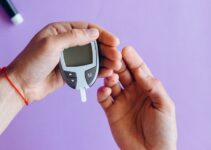Want to conquer those post-meal blood sugar spikes once and for all? Look no further! Here are 10 practical tips to effectively manage your blood sugar levels with Berbaprime.
From timing your intake to choosing the right foods and staying consistent, these tips will help you take control of your post-meal glucose levels. No more guessing games or feeling overwhelmed – with the right strategies, you can keep your blood sugar in check and feel more confident in your daily routine.
Let's dive in and discover how Berbaprime can make a positive impact on your post-meal blood sugar control.
Key Takeaways
- Choosing foods with low glycemic index helps control post-meal glucose spikes.
- Timing Berbaprime intake effectively controls post-meal blood sugar levels.
- Regular physical activity improves blood sugar regulation.
- Monitoring post-meal glucose levels helps manage potential spikes and adjust meal plans for better health.
Understanding Post-Meal Glucose Spikes
When you consume a meal, your blood sugar levels can experience significant spikes, which can be better understood through the concept of post-meal glucose spikes. One way to manage these spikes is by understanding the glycemic index of the foods you eat. The glycemic index measures how quickly carbohydrates in food raise blood sugar levels. Foods with a high glycemic index can cause rapid spikes in blood sugar, while those with a low glycemic index lead to more gradual increases. By choosing foods with a lower glycemic index and practicing carbohydrate moderation, you can help control post-meal glucose spikes.
Understanding the concept of carbohydrate moderation is key in managing post-meal glucose spikes. It involves being mindful of the amount and types of carbohydrates you consume, as they've a direct impact on blood sugar levels. By moderating your carbohydrate intake and choosing complex carbohydrates over simple ones, you can better manage your blood sugar levels after meals. This approach can contribute to more stable and healthier post-meal blood sugar control.
Importance of Timing Berbaprime Intake
You need to understand the optimal timing for taking Berbaprime to have the most significant impact on your blood sugar levels.
Timing your intake correctly can help you effectively control your post-meal glucose spikes.
Paying attention to when you take Berbaprime can make a real difference in managing your blood sugar levels.
Optimal Intake Timing
After you have finished your meal, it's crucial to take Berbaprime at the optimal time to effectively control your post-meal blood sugar levels. To ensure the best outcome, consider the following:
- Meal Composition: The composition of your meal plays a significant role in determining the optimal timing for Berbaprime intake. Meals high in carbohydrates or sugars may require quicker Berbaprime intake to manage the subsequent blood sugar response effectively.
- Include high-fiber foods and lean proteins to slow down the digestion and absorption of carbohydrates, allowing for a more gradual blood sugar increase.
- Avoid excessive consumption of simple sugars and refined carbohydrates, as they can lead to rapid spikes in blood sugar levels, necessitating prompt Berbaprime intake for effective control.
Impact on Blood Sugar
Taking Berbaprime at the optimal time is crucial for effectively controlling your post-meal blood sugar levels, ensuring that you manage the impact on your blood sugar effectively. Meal planning plays a vital role in blood sugar management, and integrating Berbaprime intake into your mealtime routine can significantly influence your post-meal blood sugar levels. By understanding the impact of Berbaprime on your blood sugar, you can strategically plan your meals and medication intake to achieve better control over your blood sugar levels. Here's a helpful table to illustrate the impact of timing Berbaprime intake on post-meal blood sugar levels:
| Time of Berbaprime Intake | Post-Meal Blood Sugar Impact | Meal Planning Adjustment |
|---|---|---|
| Before meal | Decreased | Plan lighter meals |
| During meal | Moderate | Adjust portion sizes |
| After meal | Increased | Choose low-glycemic index foods |
Understanding how the timing of Berbaprime intake can influence your blood sugar levels is crucial for effective blood sugar management.
Choosing Low-Glycemic Index Foods
Select low-glycemic index foods to help manage your post-meal blood sugar levels effectively. When choosing low-glycemic index foods, consider the following strategies:
- Choosing fiber-rich options:
- Incorporate whole grains such as quinoa, barley, or bulgur into your meals. These options are high in fiber, which can help slow down the release of sugar into your bloodstream, preventing rapid spikes in blood sugar levels.
- Opt for legumes like lentils, chickpeas, and black beans, which aren't only excellent sources of plant-based protein but also rich in fiber. Including these in your meals can aid in better blood sugar control.
- Portion control strategies:
- Pay attention to portion sizes, especially when consuming starchy foods like potatoes, rice, and pasta. While these foods can be part of a healthy diet, it's important to moderate your portions to avoid significant increases in blood sugar levels.
- Incorporate healthy fats and lean proteins into your meals to help slow down the absorption of carbohydrates, promoting better blood sugar management.
Impact of Exercise on Blood Sugar
Regularly engaging in physical activity can significantly impact your blood sugar levels. Exercise benefits your body in numerous ways, including improving blood sugar regulation. When you engage in physical activity, your muscles use glucose for energy, which helps lower your blood sugar levels. Moreover, exercise makes your cells more sensitive to insulin, allowing them to use glucose more effectively. This sensitivity can last for hours after you finish exercising, leading to better blood sugar control throughout the day.
In addition, regular physical activity can help prevent insulin resistance, a condition in which your body doesn't respond effectively to insulin, leading to high blood sugar levels. By staying active, you can reduce your risk of developing type 2 diabetes and better manage your blood sugar if you already have diabetes.
Furthermore, exercise can also have a positive impact on your overall well-being, reducing stress and promoting better sleep, both of which can indirectly contribute to improved blood sugar regulation. Therefore, incorporating regular physical activity into your routine is crucial for managing your blood sugar levels and maintaining a healthy lifestyle.
Monitoring Post-Meal Glucose Levels
You need to stay on top of your post-meal glucose levels to manage any potential spikes effectively.
Monitoring your blood sugar after meals is crucial for understanding how different foods affect your body.
Importance of Tracking
Tracking your post-meal glucose levels is crucial for understanding how your body responds to different foods and for effectively managing your blood sugar. It provides valuable insight into the impact of your dietary choices and helps you make informed decisions for better health.
Here's why tracking is important:
- Glucose monitoring
- Allows you to identify patterns and trends in your blood sugar levels after meals
- Helps you recognize which foods cause significant spikes or dips in your glucose levels
- Meal planning
- Enables you to adjust your meal plans based on your post-meal glucose readings
- Empowers you to create balanced and blood sugar-friendly meals
- Health management
- Facilitates proactive management of your blood sugar levels, reducing the risk of complications
Managing Glucose Spikes
Monitoring post-meal glucose levels is essential for effectively managing blood sugar spikes and understanding your body's response to different foods. Meal planning plays a crucial role in controlling post-meal blood sugar levels. By choosing foods with a low glycemic index and balanced macronutrients, you can help prevent rapid spikes in blood sugar. Additionally, regular blood sugar monitoring after meals can provide valuable insights into how specific foods affect your body. Here's a simple table to guide your meal planning and post-meal blood sugar monitoring:
| Meal | Ideal Choices | Monitoring Time |
|---|---|---|
| Breakfast | Oatmeal, Greek yogurt, berries | 1 hour after eating |
| Lunch | Quinoa salad, grilled chicken | 1 hour after eating |
| Dinner | Grilled fish, roasted vegetables | 2 hours after eating |
| Snack | Almonds, apple slices | 1 hour after eating |
| Dessert | Dark chocolate, mixed berries | 1 hour after eating |
Combining Berbaprime With Fiber-Rich Foods
To enhance the effectiveness of Berbaprime, consider combining it with fiber-rich foods. This combination can help in better controlling post-meal blood sugar levels. Here are some important points to consider when combining Berbaprime with fiber-rich foods:
- Berbaprime and high fiber snacks
- Choose snacks like almonds, chia seeds, or an apple with the skin on to pair with your Berbaprime intake.
- These snacks not only provide fiber but also essential nutrients that support overall health.
- Combining Berbaprime with whole grains
- Opt for whole grain options like brown rice, quinoa, or whole grain bread to accompany your Berbaprime consumption.
- Whole grains offer a good amount of fiber, which aids in slowing down the release of sugar into the bloodstream.
- Diversifying your fiber sources
- Incorporate a variety of fiber-rich foods such as legumes, vegetables, and fruits into your meals alongside taking Berbaprime.
- This diverse intake ensures a broad spectrum of nutrients and keeps your diet interesting and enjoyable.
Avoiding Sugary Beverages
When managing your post-meal blood sugar, it's crucial to avoid sugary beverages like soda and juice. Opt for water or tea instead, and be mindful of portion sizes when consuming these beverages.
Choose Water or Tea
Opt for water or tea to effectively regulate your post-meal blood sugar levels, avoiding sugary beverages. When it comes to hydration choices, water and tea are excellent options for managing blood sugar levels effectively.
Here's why opting for water or tea is beneficial:
- Hydration choices: Water and tea are both hydrating without containing added sugars, making them ideal for regulating blood sugar levels after meals.
- Water is a zero-calorie, sugar-free option that helps in maintaining proper hydration levels and aids in digestion, which can contribute to better blood sugar control.
- Tea, especially herbal and green tea, contains compounds that have been linked to improved insulin sensitivity and reduced blood sugar levels, making it a great choice for post-meal consumption.
Avoid Soda, Juice
Avoiding sugary beverages is essential for controlling your post-meal blood sugar levels. Soda and juice are loaded with added sugars that can cause a rapid spike in your blood sugar levels. Instead, opt for water or unsweetened tea to help regulate your blood sugar.
If you do choose to have a sugary beverage, practice portion control. Limit your intake to a small glass and try to consume it along with a meal to minimize its impact on your blood sugar levels.
Monitor Portion Sizes
Monitor your portion sizes of sugary beverages to help regulate your blood sugar levels effectively after meals. Practice portion control and mindful eating to manage your intake of these drinks.
Here are some tips to help you monitor your portion sizes and make better choices:
- Use smaller glasses or cups to limit the amount of sugary beverages consumed.
- Opt for a single serving size to avoid overindulging in these drinks.
- Be mindful of the frequency and quantity of sugary beverages consumed throughout the day.
- Consider diluting sugary beverages with water to reduce the overall sugar intake.
Managing Portion Sizes Effectively
You should consistently measure your portion sizes to effectively manage your post-meal blood sugar levels. Managing cravings and practicing portion control are essential for keeping blood sugar levels in check. When you measure your portions, you become more aware of the amount of food you consume, which can prevent overeating and help maintain stable blood sugar levels. Using smaller plates and utensils can also trick your mind into feeling satisfied with smaller portions.
Additionally, it's important to listen to your body and recognize when you're truly hungry versus eating out of habit or boredom. Being mindful of your hunger cues can prevent overeating and unnecessary spikes in blood sugar. When you feel the urge to snack, opt for healthy, low-carbohydrate options such as nuts, vegetables, or Greek yogurt.
Moreover, practicing portion control doesn't mean depriving yourself. It's about finding a balance and enjoying your favorite foods in moderation. By being mindful of portion sizes and making conscious choices, you can effectively manage your post-meal blood sugar levels and maintain overall health.
Consistency in Berbaprime Consumption
To effectively manage your post-meal blood sugar levels, consistency in consuming Berbaprime is crucial for achieving optimal results. Consistent consumption of Berbaprime plays a vital role in regulating your blood sugar levels, ultimately leading to better overall health and well-being.
Here are a few key points to emphasize the importance of consistency in Berbaprime consumption:
- Stabilizing Blood Sugar Levels: Consistent consumption of Berbaprime helps in stabilizing your blood sugar levels throughout the day, preventing sudden spikes or drops that can have negative effects on your health.
- Maximizing Effectiveness: Consuming Berbaprime consistently ensures that the active ingredients have a continuous presence in your system, maximizing its effectiveness in controlling post-meal blood sugar levels.
- Establishing Routine: Incorporating Berbaprime into your daily routine helps in creating a habit of mindful and consistent consumption, which is essential for long-term management of blood sugar levels.
Seeking Professional Guidance
Consider consulting a healthcare professional to tailor your Berbaprime consumption to your specific health needs. Professional consultation can provide you with expert advice and an individualized plan for managing your post-meal blood sugar levels effectively. A healthcare professional can assess your overall health status, current medications, and any underlying medical conditions to determine the most appropriate dosage of Berbaprime for you. This personalized approach takes into account your unique health circumstances, ensuring that you receive tailored guidance on incorporating Berbaprime into your daily routine.
Seeking professional guidance for using Berbaprime can also help you monitor potential interactions with other medications or supplements you may be taking. Additionally, a healthcare professional can offer insights into how to integrate Berbaprime into your existing diabetes management plan, providing comprehensive support for your overall health and well-being.
Frequently Asked Questions
Can Berbaprime Be Taken With Other Medications for Diabetes Management?
You can take Berbaprime with other diabetes medications for better blood sugar management. Combining Berbaprime effectively impacts post-meal blood sugar. Consult your doctor to ensure the compatibility and safety of the combination.
Are There Any Potential Side Effects or Interactions With Other Supplements or Herbs When Taking Berbaprime?
When taking Berbaprime, potential interactions with other supplements or herbs should be considered. It is important to be aware of any possible side effects and take necessary safety precautions to ensure your well-being.
How Long Does It Take for Berbaprime to Start Showing Effects on Post-Meal Blood Sugar Levels?
It usually takes a few weeks for you to notice Berbaprime's effects on post-meal blood sugar levels when taken at the recommended dosage. The effectiveness timeline may vary, so be patient and consistent with your usage.
Are There Specific Foods That Should Be Avoided While Taking Berbaprime for Post-Meal Blood Sugar Control?
While taking Berbaprime for post-meal blood sugar control, you should avoid high-sugar foods and excessive carbohydrate intake. Make dietary restrictions to limit processed sugars and refined carbs. Incorporate lifestyle modifications and regular exercise for better impact.
Can Berbaprime Help With Weight Management in Addition to Controlling Post-Meal Blood Sugar Levels?
Yes, Berbaprime can help with weight management in addition to controlling post-meal blood sugar levels. It complements exercise routines and dietary changes to support weight management while also regulating blood sugar levels effectively.
Conclusion
So, remember these tips for better post-meal blood sugar control with Berbaprime:
- Timing your intake
- Choosing low-glycemic foods
- Staying active
Keep an eye on your glucose levels, avoid sugary drinks, and watch your portion sizes.
Be consistent with Berbaprime and seek professional advice for the best results.
Take control of your post-meal blood sugar and live a healthier life.



